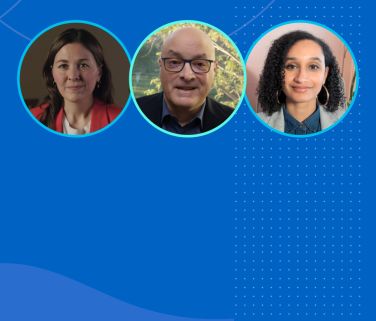In the latest episode of Impact2, Fostering Community-Based Solutions, leaders from Amgen, IFPA (the International Federation of Psoriasis Associations) and the Global Healthy Living Foundation (GHLF) discuss their shared passion for collaborating and how working collectively can make a much bigger difference in patients’ lives than working alone.
Impact2 is a conversation series that brings Amgen together with experts in patient advocacy and public health to discuss their shared values and the work they’re doing together to empower patients and help improve the patient care journey.
IFPA, GHLF and Amgen have joined forces on the UPLIFT Innovation Program, a global initiative helping doctors and patients improve their conversations about psoriasis and psoriatic arthritis. IFPA executive director Frida Dunger Johnsson, GHLF senior manager of BIPOC community outreach Sarah Shaw, and Amgen executive director of medical affairs Benoit Guerette speak about these efforts in this episode.
UPLIFT Innovation Program Addresses a Communications Gap Identified in an International Patient Survey
The UPLIFT (Understanding Psoriatic Disease Leveraging Insights for Treatment) Innovation Program answers an urgent need identified in a 2020 survey in North America, Europe and Japan.1 The survey uncovered a clear communications gap between people with psoriasis and psoriatic arthritis and their healthcare providers around perceptions of disease severity, the burden of having psoriatic disease, and treatment goals.
For example, doctors rate disease severity using standardized assessment tools, but these tools don’t consider the factors most important to patients. The standardized assessments prioritize the percentage of the body affected by psoriasis in determining severity. However, for those with psoriasis, the amount of skin affected is not a top priority. Instead, they perceive severity by the type of symptoms they have, how long they have been living with psoriasis, and where lesions are more than how many there are.
Impact2 Features Efforts to Close Health Equity Gaps to Provide Better Care for All Patients
Black, Indigenous and People of Color often face an additional challenge even before the disconnect in talking with their doctors about psoriasis: a delay in getting a diagnosis. One reason for this is that healthcare providers may not be aware of differences in how psoriasis presents on darker skin tones.
In the summer of 2021, IFPA, with support from Amgen, issued a call for actionable solutions to answer the question: “How can we unite people living with psoriatic disease and their healthcare providers to help achieve optimal health outcomes?”
GHLF answered the call, receiving a grant for BIPOC Patient Voices: Living with Psoriasis and Psoriatic Arthritis, a program to help members of the BIPOC community share their experiences. “This not only gives them a chance to educate themselves…[but to] bring that knowledge to their doctor and help them get diagnosed much quicker,” says Sarah Shaw.
Frida Dunger Johnsson says this is exactly the collaborative model IFPA is looking for. “We cannot do this on our own. We need this collaboration—uniting all the sectors working with psoriatic disease.”
The UPLIFT Innovation Program opened a new grant cycle in July 2023.
To stay up to date on the latest episodes of Impact2 and to see and hear more from our participants, follow Amgen on LinkedIn, Twitter, Facebook, Instagram and YouTube.
- Lebwohl M, et al. Evolution of patient perceptions of psoriatic disease: results from the Understanding Psoriatic Disease Leveraging Insights for Treatment (UPLIFT) survey. Dermatol Ther. Epub October 25, 2021. doi: 10.1007/s13555-021-00635-4.





